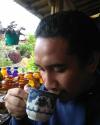Time and Place:
Mondays & Tuesdays --> 9:40-11:50 (options: THO 101/Zoom/Panopto Recording)
Wednesdays & Thursdays --> Asynchronous (activities on Canvas).
Instructor: Dimas Iqbal Romadhon (dimas@uw.edu) | Office hour (by appointment): Zoom
Official course description
In this course, we will examine the various forms of interaction between human nature and culture across the world using critical theories and creative methods. Students will participate in hybrid lectures and activities which will cultivate students’ abilities to:
- Understand interdisciplinary approaches to nature, culture, and (social and multispecies) justice in emerging Anthropocene discourse;
- Understand and apply methods of social analysis to the study of more-than-human world, as well as the entanglement of humans and nonhuman that shape local/global politics, economics, and ecosystems;
- Engage questions of ethical responsibility, sociopolitical action, environmental justice, and collective survival shared across differences.
Materials
All materials are provided as a link on Canvas.
Requirements and grading
Students are expected to read all assigned materials and participate actively in class discussions. Students will engage in film discussions, write essays around a key concept or reading each week, and develop a final paper that demonstrates an understanding and engagement of topics, experience in field observation and library research, and a capacity for critical thinking.
|
3 Film discussions |
30% |
|
2 Short Papers (600-800 words) |
40% |
|
1 Final Paper |
30% |
|
Total |
100% |
I reserve the right to reject your submitted work if it doesn't show a serious effort–I will let you know why I think so, and you are welcome to resubmit it.
Here is the conversion scale:
Disability and religious accommodations
The Disability Resources for Students Office (DRS): 448 Schmitz, Box 355839, (206) 543-8924, uwdrs@uw.edu.
Religious accommodations on case-by-case basis (contact instructor).
Plagiarism
Plagiarism is defined as the use of work by another person, the use of work submitted to another course without the consent of both instructors, or the use of someone else’s words, ideas, or arrangement of ideas without giving proper reference to the author. This is a serious violation of the Student Honor Code. It applies to all electronic sources found on the Worldwide Web or on other online databases such as those available through our campus libraries. Please see the section on plagiarism in the Student Handbook. All plagiarized work will be graded missing.
This course will use a plagiarism detection service to identify plagiarism for any assignments submitted electronically through Canvas. This service will report any indications of the use of original text in students’ works and whether all materials quoted, paraphrased, summarized, or used from another source are appropriately referenced. Students should notify the campus administrator to delete assignments from the database or those assignments will be stored for the duration of the contract with the service.
Communication
Please check the course website regularly for course-related announcements and changes. Use the course website email tool for sending emails. Always include your name and course code (CHID 110) when contacting the instructor. Allow 48 hours for responses to email inquiries and do not expect to receive a response over the weekend. I will not engage in lengthy email exchanges about assignment results with individual students, instead use office hours for discussing materials, grades, and obstacles.
Other resources
Campus writing centers: https://www.lib.washington.edu/ougl/owrc
Library/Librarian: https://guides.lib.uw.edu/research/anthropology
Counseling center: https://www.washington.edu/counseling/about/
SafeCampus: https://www.washington.edu/safecampus/
Q Center: https://sites.uw.edu/qcenter/
Black Student Union: https://huskylink.washington.edu/organization/uwblackstudentunion
Husky Health and Wellbeing: https://wellbeing.uw.edu/
Emergency Aid: https://www.washington.edu/emergencyaid/
UW Pantry: https://www.washington.edu/anyhungryhusky/the uw food pantry/
National Suicide Prevention Line: Call 1 800 273 TALK (8255). Text “START” to 741 741 to reach the Crisis Text Line.
Meeting Schedule
|
June 17, 2024 - History of Environmentalism |
|
June 18, 2024 - Contemporary Environmentalism and Its Discontents https://www.nytimes.com/2018/10/26/us/white-women-calling-police-black-men.html Podcast: Black Lives Matter and the Climate | How to Save a Planet (gimletmedia.com) (45:59) |
|
June 19, 2024 - Film Discussion 1: The Rights of Nature |
| June 20, 2024 - Essay 1. Due: Saturday June 22, 2024, at 23:59PM |
|
June 24, 2024 - From Anthropocene to Capitalocene Raj Patel and Jason W. Moore. A History of the World in Seven Cheap Things. (Introduction) Podcast--Is your carbon footprint BS? |
|
June 25, 2024 - Global Environmental Injustice The Last Generation | FRONTLINE | PBS 1992 Basel Convention on the Control of Transboundary Movements of Hazardous Wastes. |
|
June 26, 2024 - Film Discussion 2: The Island President |
| June 27, 2024 - Essay 2. Due June 29, 2024, 23:59PM. |
|
July 1, 2024 - Biodiversity Conservation |
|
July 2, 2024 - Multispecies Justice |
| July 3, 2024 - Film Discussion 3: The Burning Season |
| July 4, 2024 - No class. |
| July 9, 2024 - Office hours |
| July 10, 2024 - No class--working on final paper |
| July 11, 2024 - No class--working on final paper |
| July 17, 2024 - The last day to submit final paper |
